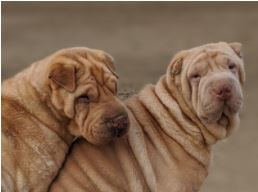The Shar-Pei
The Shar-Pei can be traced back to the province of Kwung Tung , and is thought to be related to the Chow Chow and the Tibetan Mastiff. The breed started out as a working companion of farmers and peasants who used them for cattle herding, guarding and hunting.The loose skin and small ears protected the Shar-pei in battles, and this regretfully also made him suitable as a fighting dog
The Shar-Pei's coarse, bristly coat gives him his name: Shar is a gritty type of sand, and pei is Chinese for dog. Like the Chow Chow, these dogs have a blue-black tongue
When China became a communist nation it’s dog population was virtually extinguished but thanks to Matgo Law, a few Shar-Pei's were exported to the United States in the 1960's and 1970's which saved them from oblivion,

Pic Shar Pei Rescue - If considering one of these wonderful dogs, do consider breed rescue. Breed rescue are excellent at matching dogs with homes and passionate about their breeds. Link below and if not near you, do search for one that is. http://www.sharpeirescue.me.uk/
Shar Peis are loyal to their handler intelligent, playful and dominant.They are also easy-going, calm, independent, and devoted . They can be aloof with strangers, and a little bit arrogant.
This breed needs a confident handler and Shar-peis are not recommended for novice dog owners.They do make great city dogs as they are satisfied with daily walks as opposed to vigorous exercise.
It must always be remembered that Shar-peis have a lower aggression threshold and a lower proximity tolerance toward other dogs than most other breeds.
Small children should never be left unsupervised with any dog, and Shar- peis in particular will rarely tolerate rough handling by children and may assert themselves by snapping or biting.
Shar-peis have strong instincts and have been known to chase and seize fleeing cats or other small animals that could be perceived as prey.They should not be kept with with livestock. If something goes awry in breeding, socializing, training, handling, or managing this breed, it is capable of seriously injuring or killing other animals. It is absolutely vital that your dog is obtained from a very reputable breeder.
Inter dog aggression can be severe and males should always be neutered. Shar-Pei puppies must be exposed to other friendly dogs as much as possible to prevent possible aggression later on in life. If you are considering more than one Shar-pei avoid getting puppies from the same litter or of the same sex as competing for the same resources may lead to aggression and resource - guarding between the dogs.
Early and thorough socialization is imperative to ensure that your Shar-pei becomes accustomed to strangers and other animals. If a Shar-Pei is socialized to cats, children and people early on, there will rarely be any problems.
These dogs are noisy and they are known for their endearing grunting,snorting,gurgling and snoring noises. They are also prone to drooling , especially when excited and it is advisable to always have a facecloth at hand to wipe the slobber away!
Shar-Peis are clean dogs and very easily house-trained. They need minimal grooming and brushing them once a week is sufficient. They also do not require frequent bathing; every 12 weeks is acceptable.In fact, over-bathing a Shar-Pei may cause skin ingratiation.
The most essential part of grooming a Shar-Pei is maintaining those adorable wrinkles. After a bath, wrinkles must be dried thoroughly to prevent fungal infections.
A Shar-Pei's ears must be checked regularly for signs of infection, Ask your vet to show you the proper technique to check and cleaning your Shar-Pei's ears. Tooth brushing should be part of the grooming regimen as it keeps teeth and gums healthy, and wards off the dreaded doggie breath
The Shar-Pei can have a very dominant and stubborn streak which can make training a challenge. If a handler is inconsistent or wavering in their commands and training, the Shar-Pei may refuse to obey cues and commands. It is important that if the dog is in a family setting ,he be trained to respond to all family members in the same way to maintain harmony in the human/canine hierarchy.
Their wrinkles make the Shar-Pei prone to skin disease and dermatitis. The skin disease may first become visible from 10 months of age and an unpleasant odour generally accompanies the disease.
The deep set eyes and folds around the eyes can cause turned in eyelids or entropion. Surgery may be required to correct this. Other health concerns include kidney failure (amolydosis) which causes a fever and swollen hocks syndrome.Due to over popularity and careless breeding in the 1980's,hereditary skin problems have occured in the past . Shar-peis may also suffer from mast cell tumors.
“In today’s age, with the rising cost of veterinary care, it really is a wise decision to consider medical insurance for your pets. Depending on the plan you choose, you can ensure that if your pet does develop one of the health issues the breed is prone too, that you will be covered –additionally, just knowing that any accident your pet may have will be covered, will out-weigh the monthly insurance fee for most pet owners. Our own personal choice is Genricpet as they have a ‘no limit’ policy and their rates are comparable to the rest of the industry. To find out the questions and things to look for in a Medical Insurance, please just follow this link”
A Shar-pei has an average lifespan of 10 years.
Shar-peis are a pleasure to own and make loving and loyal companions, however always ensure that you get your puppy from a reputable breeder and remember that as a Shar-pei owner it is your responsibility to make a firm commitment to your Shar-pei's ongoing socialization and training.
This breed needs a confident handler and Shar-peis are not recommended for novice dog owners.They do make great city dogs as they are satisfied with daily walks as opposed to vigorous exercise.
It must always be remembered that Shar-peis have a lower aggression threshold and a lower proximity tolerance toward other dogs than most other breeds.
Small children should never be left unsupervised with any dog, and Shar- peis in particular will rarely tolerate rough handling by children and may assert themselves by snapping or biting.
Shar-peis have strong instincts and have been known to chase and seize fleeing cats or other small animals that could be perceived as prey.They should not be kept with with livestock. If something goes awry in breeding, socializing, training, handling, or managing this breed, it is capable of seriously injuring or killing other animals. It is absolutely vital that your dog is obtained from a very reputable breeder.
Inter dog aggression can be severe and males should always be neutered. Shar-Pei puppies must be exposed to other friendly dogs as much as possible to prevent possible aggression later on in life. If you are considering more than one Shar-pei avoid getting puppies from the same litter or of the same sex as competing for the same resources may lead to aggression and resource - guarding between the dogs.
Early and thorough socialization is imperative to ensure that your Shar-pei becomes accustomed to strangers and other animals. If a Shar-Pei is socialized to cats, children and people early on, there will rarely be any problems.
These dogs are noisy and they are known for their endearing grunting,snorting,gurgling and snoring noises. They are also prone to drooling , especially when excited and it is advisable to always have a facecloth at hand to wipe the slobber away!
Shar-Peis are clean dogs and very easily house-trained. They need minimal grooming and brushing them once a week is sufficient. They also do not require frequent bathing; every 12 weeks is acceptable.In fact, over-bathing a Shar-Pei may cause skin ingratiation.
The most essential part of grooming a Shar-Pei is maintaining those adorable wrinkles. After a bath, wrinkles must be dried thoroughly to prevent fungal infections.
A Shar-Pei's ears must be checked regularly for signs of infection, Ask your vet to show you the proper technique to check and cleaning your Shar-Pei's ears. Tooth brushing should be part of the grooming regimen as it keeps teeth and gums healthy, and wards off the dreaded doggie breath
The Shar-Pei can have a very dominant and stubborn streak which can make training a challenge. If a handler is inconsistent or wavering in their commands and training, the Shar-Pei may refuse to obey cues and commands. It is important that if the dog is in a family setting ,he be trained to respond to all family members in the same way to maintain harmony in the human/canine hierarchy.
Their wrinkles make the Shar-Pei prone to skin disease and dermatitis. The skin disease may first become visible from 10 months of age and an unpleasant odour generally accompanies the disease.
The deep set eyes and folds around the eyes can cause turned in eyelids or entropion. Surgery may be required to correct this. Other health concerns include kidney failure (amolydosis) which causes a fever and swollen hocks syndrome.Due to over popularity and careless breeding in the 1980's,hereditary skin problems have occured in the past . Shar-peis may also suffer from mast cell tumors.
“In today’s age, with the rising cost of veterinary care, it really is a wise decision to consider medical insurance for your pets. Depending on the plan you choose, you can ensure that if your pet does develop one of the health issues the breed is prone too, that you will be covered –additionally, just knowing that any accident your pet may have will be covered, will out-weigh the monthly insurance fee for most pet owners. Our own personal choice is Genricpet as they have a ‘no limit’ policy and their rates are comparable to the rest of the industry. To find out the questions and things to look for in a Medical Insurance, please just follow this link”
A Shar-pei has an average lifespan of 10 years.
Shar-peis are a pleasure to own and make loving and loyal companions, however always ensure that you get your puppy from a reputable breeder and remember that as a Shar-pei owner it is your responsibility to make a firm commitment to your Shar-pei's ongoing socialization and training.

